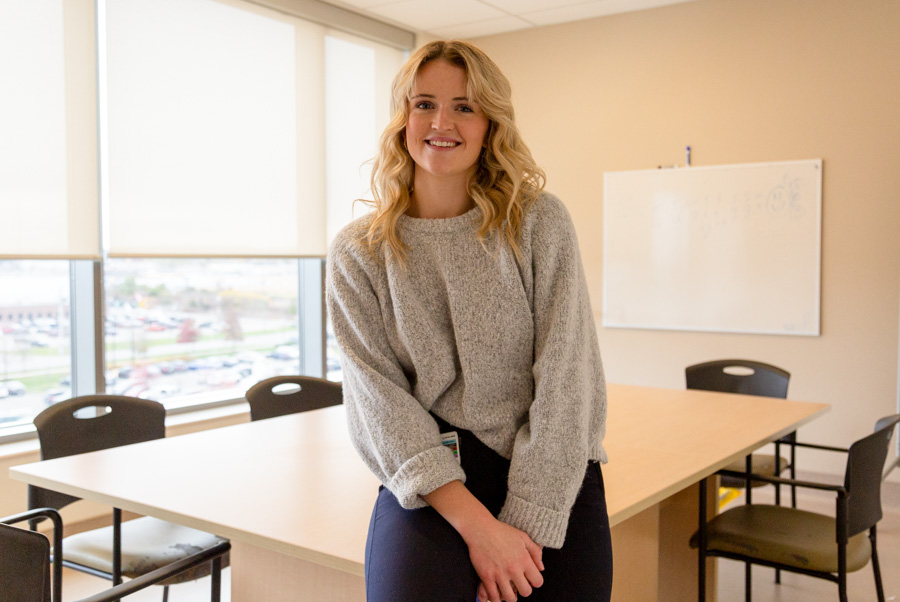We are Niagara Health is a series of stories that celebrates the incredible people working and volunteering in our organization and how they make a difference in the lives of patients and coworkers every day.

Kailee Morrison was named the CanVECTOR Research Co-ordinator of the year for her work as the Thrombosis program's research co-ordinator.
Having an aptitude for math and science is undoubtedly helpful for a research co-ordinator involved in clinical trials focused on finding new healthcare treatments.
It turns out, having a way with words is a critical skill, too. Ask Thrombosis Research Co-ordinator Kailee Morrison and she’ll tell you that successfully recruiting participants to a clinical trial is all in how you sell it.
“It’s the wording that can make a difference when approaching a patient about participating in a trial,” Morrison says. “That was something I had to work on. It can make or break things.”
If being named Research Co-ordinator of the Year by the Canadian Venous Thromboembolism Network (CanVECTOR) is any indication, though, Morrison is making it more than breaking it with patients, including maintaining their data in studies that could change the standards for preventing and treating blood clots.
Morrison received the honours in October at the VASCULAR 2023 conference in Montreal. It’s particularly notable because Morrison won the award after less than a year on the job.
The significance isn’t lost on her especially because she never considered herself a candidate.
“There’s a bit of imposter syndrome to being recognized in this position,” Morrison says. “I was thinking when the nominations came out, ‘Who should I nominate?’”
Being so new to the role did make the recognition extra special, she notes. It also added to what could be called a storybook career, even if it’s still in the earliest of chapters.
It was only in September 2022 that Morrison started a graduate certificate program in clinical trials management at Western University. She made the leap after completing her biology degree at Queen’s University, realizing she was more interested in her elective courses – anatomy, physiology and pharmacology – than the core subjects of her program.
Early on at Western, students were assigned to look up job postings in their field and study the qualifications. Morrison saw an opening for a research co-ordinator at Niagara Health, and based on the job description and streamlined application process, threw her name into the competition.
“I thought ‘Why not?’ I submitted my application and forgot about it until a month later when Niagara Health contacted me. Everything was ‘I may as well try this’ and everything lined up for me.”
Morrison got the job, continuing her studies online while helping to launch four clinical trials in the newly minted Thrombosis research program helmed by Dr. Blair Leonard, Director of Niagara Health’s Thrombosis Service and Regional Physician Lead for Benign Hematology and Thrombosis.
“Kailee possess the right tools and desire to make a difference in Medical Research and she’s made great use of this opportunity," Dr. Leonard says. "In the year Kailee’s been here, we have opened five clinical trials and are in negotiations for a sixth. We are now recognized in the Canadian Thrombosis Research Community as a major player, and Kailee has been instrumental in the Niagara Thrombosis Research Program becoming so successful.”
"This work is giving people in Niagara the chance to participate in huge studies happening worldwide that can change healthcare for the future. I want to do my best to explain to patients what their role in research is and what the medications are, and how this could improve their care long-term."
A shining example in clinical trials management
The program is also growing to add two research assistants from Brock University who will help Morrison with patient screening and recruitment. She also took on the Neurology clinical trials portfolio and an additional Cardiology study after the physician lead moved on to practise medicine overseas.
Niagara Health, she says, has been incredibly supportive of her completing her studies while training her for her role.
“This is everything I could want in a job, especially early in my career,” Morrison says. “It’s a little bit patient-facing, there’s research, statistics, data analytics, and I’m still working in healthcare without having to be a nurse or doctor. It’s also a very independent role. It’s a good mix of my interests.”
Meanwhile, back at Western, her professor shares her story as an example of the promise held by a career in clinical trials management. He was one of the first people Morrison told when she won the CanVECTOR award.
“I felt like I owed that to him,” she says. “He often uses my story with students. A lot of students are reluctant to apply to jobs because they don’t have the experience. My job description said two to three years' experience. You can always learn things in class but when I was doing things at the hospital, it really solidified my learning.”
That includes how to approach patients, concerned with their own health, to participate in clinical trials for treatments that may or may not help them, but could one day aid countless others.
“It’s getting patients to understand that Benadryl and other medications on store shelves went through rigorous testing for years before ending up there,” Morrison says. “This work is giving people in Niagara the chance to participate in huge studies happening worldwide that can change healthcare for the future.
“I want to do my best to explain to patients what their role in research is and what the medications are, and how this could improve their care long-term. This work is not for our own benefit as researchers.”

